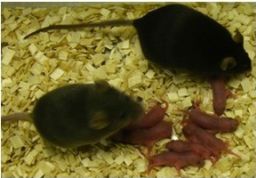Story highlights
New findings suggest sperm alone could be used to create children in the future
Research overturns almost 200 years of knowledge about fertilization
It might be possible in the future to make babies without female eggs, new research claims.
Scientists at Bath University in the United Kingdom say they have successfully used sperm to create healthy baby mice by injecting the sperm cells directly into embryos.
“Up until now people thought the only way you could fertilize a cell with a sperm and have offspring is if the cell is an egg,” Dr Tony Perry, University of Bath molecular embryologist and senior researcher, told CNN.
“(We thought) only a sperm in an egg can give you offspring. So that’s something that kind of erodes from the first.”
This isn’t the first time scientists have attempted unconventional fertilization techniques – previously researchers “tricked” eggs into developing into embryos without fertilization by sperm.
But the resulting embryos died after just a few days.
200 years of science overturned?

According to the study, which was released in the journal Nature on September 13, one in four mice born using only sperm and an embryo survived and grew to be healthy adults, able to procreate.
“Our work challenges the dogma, held since early embryologists first observed mammalian eggs around 1827 and observed fertilization 50 years later, that only an egg cell fertilized by a sperm cell can result in a mammalian birth,” Perry said in a statement
Speaking to CNN, Perry said while at this stage the only way to create an embryo was using an egg, it could be possible in the future to create embryos without the original female cell.
“Mother Nature does that for us and we know a lot about it but we probably don’t know enough yet to recapitulate the process in other cell types,” he said.
The discovery could have potential applications for distant future treatment of infertility, Dr Paul Colville-Nash from the UK’s Medical Research Council said in a statement.
“This is an exciting piece of research which may help us to understand more about how human life begins and what controls the viability of embryos, mechanisms which may be important to fertility.” The Medical Research Council helped fund the research.



